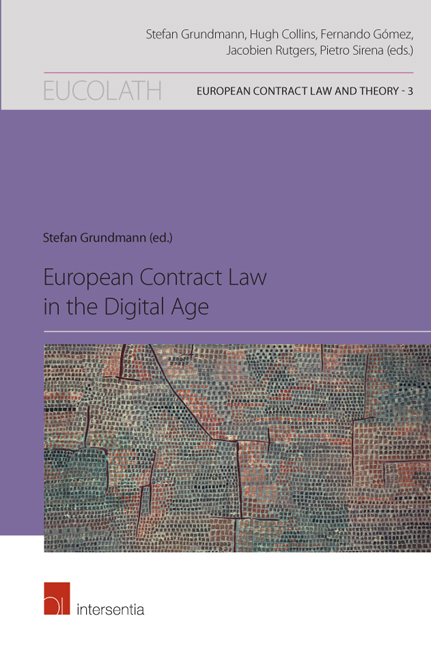Book contents
- Frontmatter
- Contents
- Table of Cases
- List of Authors
- PART I The Overall Architecture
- Part II Institutional Framework – Platforms, Regulation Issues, Global Surroundings
- Part III Digital Formation of Contract – More Virtual and More Formalised
- The E-Commerce Directive, Consumer Transactions, and the Digital Single Market – Questions of Regulatory Fitness, Regulatory Disconnection and Rule Redirection
- Connected Contracts Reloaded – Smart Contracts as Contractual Networks
- The Silk Road Revisited – Money Transactions Inside the Bitcoin System
- Part IV Development and Implementation of Contract – More Digital, More Liquid
- Part V Digital Objects of Contract – CESL II and More
- Index
- European Contract Law and Theory Series
The Silk Road Revisited – Money Transactions Inside the Bitcoin System
from Part III - Digital Formation of Contract – More Virtual and More Formalised
Published online by Cambridge University Press: 11 October 2018
- Frontmatter
- Contents
- Table of Cases
- List of Authors
- PART I The Overall Architecture
- Part II Institutional Framework – Platforms, Regulation Issues, Global Surroundings
- Part III Digital Formation of Contract – More Virtual and More Formalised
- The E-Commerce Directive, Consumer Transactions, and the Digital Single Market – Questions of Regulatory Fitness, Regulatory Disconnection and Rule Redirection
- Connected Contracts Reloaded – Smart Contracts as Contractual Networks
- The Silk Road Revisited – Money Transactions Inside the Bitcoin System
- Part IV Development and Implementation of Contract – More Digital, More Liquid
- Part V Digital Objects of Contract – CESL II and More
- Index
- European Contract Law and Theory Series
Summary
ABSTRACT
The chapter sets out to show a chain between the many aspects of Bitcoin as a regime of exchange and contract-based transactions, and to lay a basic groundwork of understanding for Bitcoin as a framework for transactions. Relevant aspects are Bitcoin’ s status as money, the different and functional qualities that it shares with other types of money, its distributed technical nature and structural integrity, as well as its ideological roots incorporated in technology. An exciting addition onto the open final link of this chain is the advent of new decentralised Bitcoinbased marketplaces where the goal is to include the transactions themselves inside Bitcoin's ‘blockchain’ – the foundation of this digital regime of exchange. Historical lines are drawn between Bitcoin and the ancient cultures of Mesopotamia in 3000 BC. While the attributes of the monetary system used in the Cradle of Civilisation are the antithesis of Bitcoin when it comes to the dichotomy of geographical centralisation/decentralisation, it evinces strong similarities concerning the relative unimportance of material tokens. A further shared trait is traced, one that is likely to prove revolutionary in the future: the intimate connection between the monetary system itself and the transactions performed using it.
The Silk Road was launched in 2011. That is to say, this was when an online marketplace that called itself the ‘Silk Road’ was launched. The principal items on sale at this digital market were, unsurprisingly, various illicit substances, and the parties frequenting this marketplace settled their transactions by a direct transfer of something called ‘Bitcoin’. In this online version of buying drugs for cash in dark back-alleys, there were no banks or bank-backed payment systems involved, only this money-like thing called ‘Bitcoin’, which purported to sustain its integrity upon a technology without a central point of control. Now, years after the new Silk Road was shut down, Bitcoin is being used by wholly legal online stores as well as some banks and even state authorities.
HIGH PRIEST NAKAMOTO
The key realization was that there’ s no difference between modern culture and Sumerian. We have a huge workforce that is illiterate or alliterate and relies on TV – which is a form of oral tradition. And we have a small, extremely literate power elite … who control society because they have this semimystical ability to speak magic computer languages.
- Type
- Chapter
- Information
- European Contract Law in the Digital Age , pp. 237 - 260Publisher: IntersentiaPrint publication year: 2018



